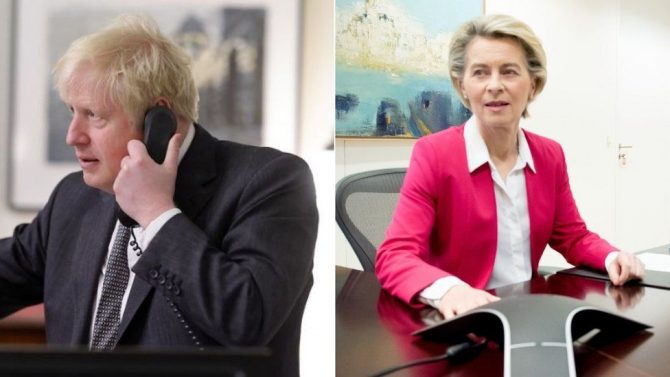
Boris Johnson and Ursula von der Leyen to meet later this week
The move follows progress in talks led by Britain’s Michael Gove and the EU’s Maros Sefcovic on issues including the Northern Ireland protocol.
Under the protocol, goods will not need to be checked along the Irish border when the new UK-EU relationship starts on January 1, 2021.
It will be good news for traders and businesses along the Derry/Donegal border that they can move their goods either way without checks.
In a joint statement, the UK and EU said that “an agreement in principle” had been reached on all issues.
In view of these “mutually-agreed solutions”, the UK Government will withdraw clauses 44, 45 and 47 of the UK Internal Market Bill – which could have overridden the Withdrawal Agreement – and it will not introduce any similar provisions in the Taxation Bill.
Meanwhile, the European Commission has said the meeting between Boris Johnson and Commission President Ursula von der Leyen this week will not be a negotiation as such, but will be an attempt to unlock political obstacles so that their respective negotiators can get back to work.
The commission also said that if there is no breakthrough then a no-deal situation will apply from 1 January, but both sides could continue talking after that point on the same legal basis.
While there is no confirmation of the date of the meeting, President von der Leyen’s spokesman Eric Mamer told reporters in Brussels: “It’s very difficult to speculate what might be the outcome of the meeting, which will take place…
“What is clear is that we’re not trying to fix down any kind of definitive framework for negotiations for a meeting between two leaders. That’s not where negotiations happen.
“The meeting will be to try and lift substantial impasses so that then the negotiators can continue their work.”
The commission would not be drawn on whether its chief negotiator Michel Barnier would be required to step down on his 70th birthday on 9 January next year, according to the EU’s internal employment rules.
Mr Mamer said: “Yes, there’s an age limit which comes into force on his 70th birthday, which applies to all EU officials and temporary agents.
“When it comes to arrangements in terms of the negotiating team it’s up to the commission to decide how it intends to organise things”.
Mr Mamer added: “It’s obvious in any case the commission would continue to have a negotiating team that would be able to negotiate with the British, but obviously we’re not going to speculate on that. We’re trying to see if we can wrap up this negotiation before December 31.”
Mr Barnier, meanwhile, said the EU is fully united over the approach to the trade talks and that if Britain wanted access to the EU’s market then it would have to accept conditions.
“We will never sacrifice our future for the present. Access to our market comes with conditions,” Mr Barnier wrote on Twitter. “Full unity.”
He said he had briefed European member states and that he was working with British chief negotiator David Frost to prepare for the meeting between Ms von der Leyen and Mr Johnson.
Earlier, the British Prime warned that the talks with the EU were proving “very tricky” and while he was still hopeful about reaching a deal, it was proving “very, very difficult” to make progress.
Mr Johnson said he hoped the “power of sweet reason” would triumph but Brussels had to accept there were limits to what terms the UK would be prepared to accept.
Talks have faltered on the issues of fishing rights, the “level playing field” measures aimed at preventing the UK undercutting the EU on standards and state subsidies, and the way that any deal would be governed.
In a message to Brussels, Mr Johnson said: “Our friends have just got to understand the UK has left the EU in order to be able to exercise democratic control over the way we do things.
“There is also the issue of fisheries where we are a long way apart still.
“But hope springs eternal, I will do my best to sort it out if we can.”
Mr Johnson acknowledged that there may be a point where it is “time to draw stumps” and accept that a deal is impossible.
“There are just limits beyond which no sensible, independent government or country could go and people have got to understand that.”
He again insisted the UK will “prosper mightily” with or without a trade deal with the European Union, despite grim warnings from the UK’s budget watchdog and the governor of the Bank of England about the impact.
Tags:




